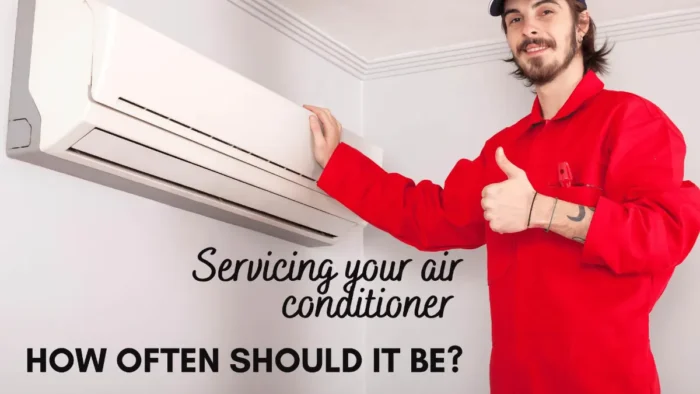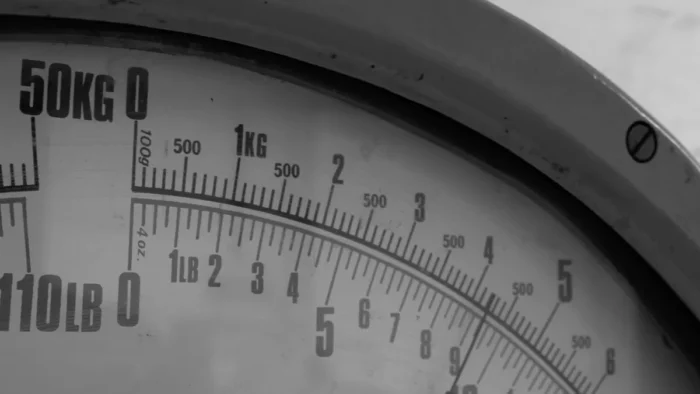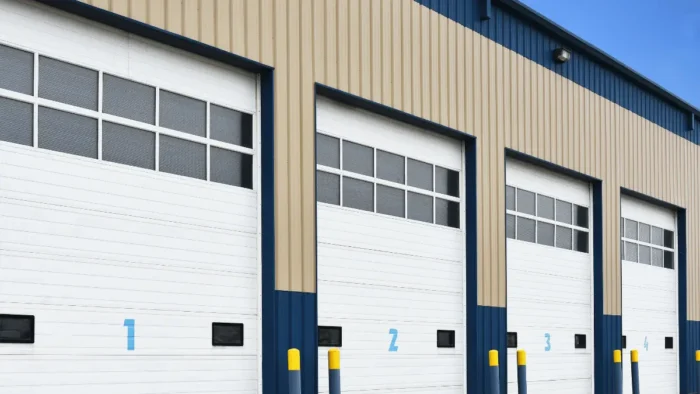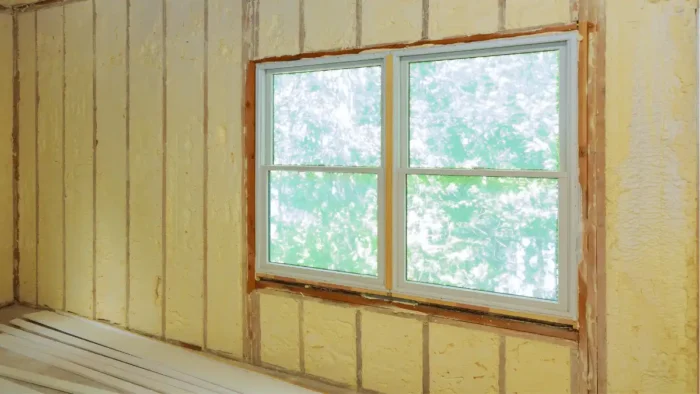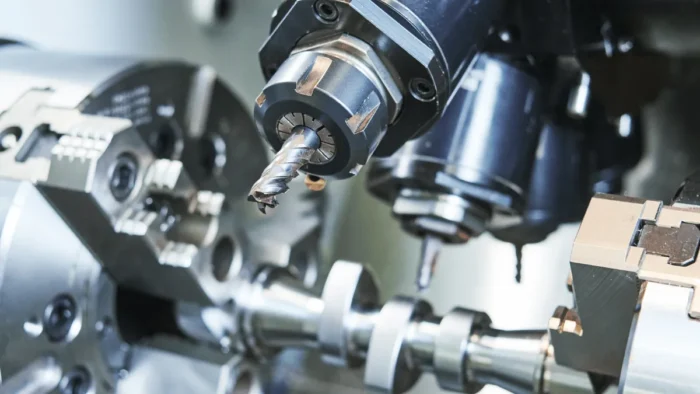Are you wondering how often you should service your air conditioner (AC) or heating, ventilation, and air conditioning (HVAC)? It’s a common question among homeowners who want to maintain the efficiency and longevity of their cooling system. The truth is that regular maintenance is essential to keep your air conditioner running smoothly. If you do not have your air conditioner serviced, you risk accumulating dirt and grime and breaking down. Non-service of an air conditioner is a direct cause of air conditioning failure. Air conditioners work as a frontline measure to prevent people from suffering from the ill effects of soaring temperatures and tropical weather.
Proper maintenance can prevent major breakdowns, improve the quality of the indoor air, and save you money on energy bills. However, the frequency of servicing depends on various factors like usage, climate, and the age of your air conditioner. Our experts will break down these factors and guide you through a step-by-step process to determine the ideal service schedule that suits your needs.
So, how often should you service your air conditioning unit?
What Happens If You Do Not Have Your System Serviced?
Every year, millions suffer from heat intolerance, with many dying. Unfortunately, heat intolerance can affect anyone, regardless of their origin. This is why air conditioning is so crucial, as it is a preventative measure for potential illness.
You must ensure your air conditioning unit is fully serviced and up to date and never allowed to fall into disrepair. You can also service your unit yourself, which will be elaborated upon later.
Proper maintenance can prevent major breakdowns, improve quality of the indoor air, and save you money on energy bills. Ignoring service can reduce efficiency, increase energy consumption, and bring costly repairs.
One of the primary reasons to service your AC system regularly is to prevent major breakdowns. Over time, dust, dirt, and debris can accumulate in the system, causing clogs and reducing airflow. This can weaken the components, leading to increased wear and tear. By servicing your AC, you can identify and address any potential issues before they escalate into major problems.
Without regular servicing, you can not accept indoor air quality. Air conditioners not only cool the air but also filter out dust, pollen, and other airborne particles. However, if the filters and coils are dirty, they can become breeding grounds for mold and bacteria, which can then be circulated throughout your home. Regular servicing includes cleaning and replacing filters, ensuring that the air you breathe is clean and healthy.
Lastly, your energy bills will increase without proper and timely maintenance. When your air conditioner is dirty or not functioning optimally, it needs to work harder to cool your home. This extra effort translates into higher energy consumption and increased utility costs. By scheduling regular maintenance, you can ensure that your air conditioner operates efficiently, saving you money in the long run.
Factors That Affect How Often You Should Service Your Air Conditioner
The frequency of servicing your AC system depends on various factors, including usage, climate, and the age of your unit.
The first factor to consider is the usage. If you use your AC or HVAC system year-round or for extended periods, it will accumulate more dust and waste, requiring more frequent servicing. On the other hand, if you only use it seasonally or sparingly, you may be able to get away with less frequent servicing.
The climate also plays a role in determining how often you should do the service. If you live in an area with high humidity or pollution, your HVAC system is more likely to collect dirt and contaminants, necessitating more frequent servicing. Similarly, if you reside in a region with extreme temperatures, you may need more frequent servicing to handle the additional workload.
The age of the system is another crucial factor to consider. Older units tend to require more maintenance due to wear and tear. It may be more vulnerable to breakdowns and inefficiency if it is over ten years old, requiring more frequent servicing.
How Often Should You Service It?

Now that you understand the factors that influence the frequency of HVAC or AC service let’s explore some general guidelines to help you determine how often you should schedule maintenance.
For most households, it is recommended to service your air conditioner at least once a year. This annual maintenance should include a thorough inspection, cleaning of coils and filters, lubricating moving parts, and checking refrigerant levels. By servicing your air conditioning system annually, you can catch any minor issues before they become major.
So, schedule annual maintenance and get your HVAC or AC serviced minimum every year.
However, in some cases, more frequent servicing may be necessary. If you live in a particularly dusty or polluted area, it may be beneficial to service your air conditioner every six months. This will help prevent the accumulation of dirt and contaminants, ensuring that your air conditioner operates at its best.
On the other hand, if you live in a relatively clean environment and use your air conditioner minimally, you may be able to stretch the servicing interval to every two years. However, it’s important to note that even if your air conditioner or heating system appears to function well, regular maintenance is still crucial to maintain efficiency and longevity.
Cool Best Aircon is a service with over eighteen years of experience, this reliable servicing company says that your AC unit can allow you to live comfortably in muggy and hot climates. This comfortability must not be compromised by air conditioner breakdown.
Signs That Your System Needs Servicing
While following a regular servicing schedule is important, it’s also essential to be aware of the signs that your HVAC system may need immediate attention. Recognizing these signs can help you address any issues promptly, preventing further damage and costly repairs.
- Reduced cooling or heating performance. If you notice that your home is not as cool or warm as it used to be, even though your HVAC system is running, it could indicate a problem with your unit. Reduced airflow, warm or cool air coming from the vents, or uneven cooling or heating throughout your home are all signs that your system requires servicing.
- Strange noises. Banging, clanking, or grinding sounds could indicate loose or damaged components. Ignoring these noises can lead to further damage and more expensive repairs down the line. If you hear any unusual sounds, it’s best to have your system inspected and serviced as soon as possible.
- Leaking water or refrigerant. Water leakage can indicate a clogged drain line or a malfunctioning condensate pump, both of which can lead to water damage if left unaddressed. Refrigerant leaks are also a serious issue, as they can affect your air conditioner’s cooling performance and efficiency. You must contact a professional for immediate air conditioner maintenance if you notice any leaks.
How Can I Service My AC Myself?
If you want to make minor services to your unit yourself, then this is fine, provided you are cautious and know what you are doing. You should not start trying to make changes and fixes to your unit if you have no clue what you are doing, lest you may break your unit even further.
So, before you start doing the job yourself, first, you need to read your manual. If you want, you can check the most extensive database of Air Conditioner Manuals.
Second, when working on your AC unit, you must ensure that it is not plugged in and that there is no power going to it, as you could potentially electrocute yourself. Always be safe when working with electrical appliances by keeping the power off.
Let’s look at what a typical DIY air conditioner service might look like:
1. Clean or Replace Air Filters

Dirty or clogged filters can restrict airflow and reduce heating and cooling efficiency. Clean or replace your air filters every one to three months, depending on usage.
Cleaning the filter is a very simple solution to dirt and grime build-up that is almost guaranteed to occur in your air conditioning unit’s filter. You can remove the filter, scrub away dirt, rinse it, and replace it. You must do this regularly, especially in humid temperatures, as it is very easy for mold and harmful bacteria to accumulate. If you suffer from allergies, then a build-up of dirt in your filter can exacerbate them and make your life a living hell. Clean your filter often.
If the air filters are damaged, you must replace them with a new one.
2. Clean Your Units
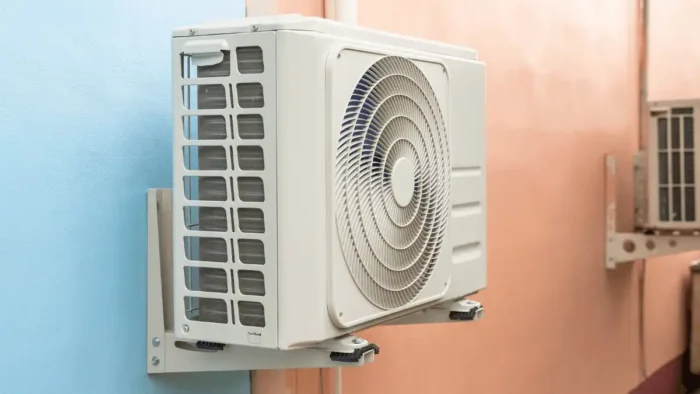
Once you have cleaned the filter, you can clean the rest of your units. However, It is very important that you do not attempt to open the outside unit when cleaning but rather clean it without taking it apart. You must always call a professional service to do this.
You can only ensure that the area around your outdoor unit is free from leaves, grass clippings, and other debris. This will allow for proper airflow and prevent the unit from overheating.
Next, you should ensure that all indoor vents are tidy and clean, brush off any dust or dirt you can see, and clear away debris. After this, pour a half bleach half water solution into the outside drain to prevent mold or fungus from building up in your ducts.
Related: All The Reasons Why the Air Conditioner Needs To Be Cleaned Regularly
3. Check Its Performance
It is very important that once you have properly cleaned your unit, you assess its performance thoroughly. You can do this by turning it up to maximum power and letting it run. Watch it while it runs, and if you notice any stuttering or any problems with it, you may have a problem. If your unit, however, runs fluidly calmly and as usual, then you should not worry. If you notice any hindrance in its performance, call in the professionals. It is not worth having to replace your unit, and servicemen do not charge much.
Now you know a few ways to improve the performance and service of your air conditioner yourself at home, as well as how frequently you should have it checked. Your air conditioning unit is a barrier between you and extreme temperatures, so treat it well.
4. Clean Your Air Conditioner’s Evaporator Coil and Condenser Coil
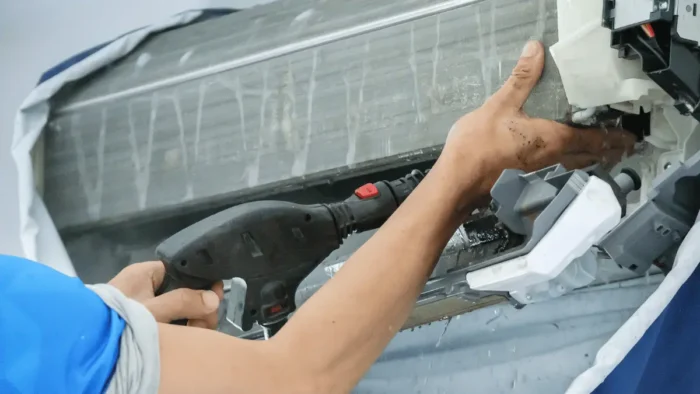
The evaporator coils located inside your home can also accumulate dirt and debris. Use a soft brush or vacuum cleaner to clean the coils and ensure proper airflow.
Also, over time, the condenser coils can become dirty, affecting the heat transfer process. Use a soft brush or vacuum cleaner to remove any dirt or debris from the coils gently.
5. Clean The Drain Line
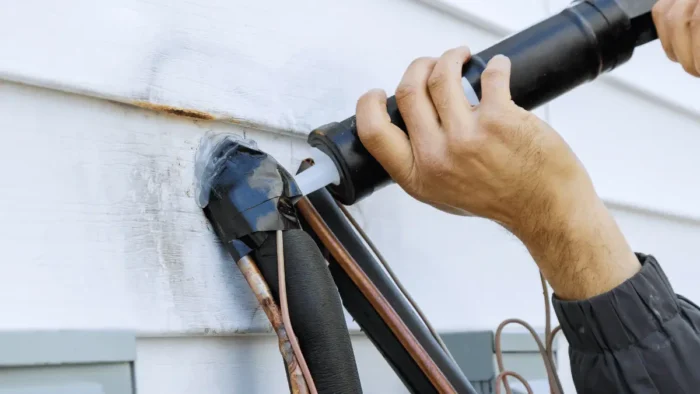
The condensate drain line removes excess moisture from your system. Regularly check the drain line for clogs and use a mixture of bleach and water to clear any blockages.
Remember, while these DIY maintenance tasks can help keep your system in good condition, they do not replace professional servicing.
Benefits of Professional Air Conditioning System Maintenance
While DIY maintenance is beneficial, professional air conditioner servicing offers many advantages that cannot be achieved through simple cleaning and maintenance tasks.
One of the primary benefits of professional AC service is the expertise and knowledge that professionals bring to the table. A trained HVAC technician has the skills and experience to identify any underlying issues with your system that may not be apparent to the untrained eye. They can diagnose problems, make necessary repairs, and ensure that your system operates at its best.
Professional servicing also includes a comprehensive inspection of your system’s components.
In addition to air conditioner repair and inspection, professional servicing also includes cleaning and maintenance tasks that may require specialized equipment and expertise. For example, an HVAC technician can thoroughly clean the coils, check refrigerant levels and condensate drain lines, and perform other tasks that contribute to the optimal performance of your system. These tasks are best left to professionals with the right tools and knowledge to perform them safely and effectively.
How Much Does It Cost Air Conditioner Maintenance?
The cost of air conditioner service can vary depending on several factors, including the size and type of your air conditioner, the extent of the servicing required, and the location of your home. On average, you can expect to pay between $80 and $200 for a standard air conditioner servicing.
For repair services, you can expect to pay between $100 and $500 for a simple repair, while more complex repairs may cost up to $1,000 or more. When your air conditioner breaks down, expect AC repair costs between $150 and $650 on average. However, this cost can also range from $100 to $4,200.
It’s important to note that while professional servicing comes with a cost, it can save you money in the long run. Regular maintenance helps prevent major breakdowns and costly repairs, which can be significantly more expensive than routine servicing. Additionally, a well-maintained air conditioner operates with higher energy efficiency, resulting in lower energy bills.
To ensure that you are getting the best value for your money, obtaining quotes from multiple servicing companies is recommended. Compare the services offered, the reputation of the company, and customer reviews to make an informed decision. Remember, the cheapest option may not always be the best, so prioritize quality and reliability.
Conclusion
Regular servicing is essential for your air conditioner’s optimal performance and longevity. By understanding the importance of servicing, the factors that influence the frequency of maintenance, and the benefits of professional servicing, you can ensure that your system operates smoothly, keeps your home comfortable, and saves you money because of higher energy efficiency.
Remember to follow the recommended frequency for servicing based on your usage, climate, and the age of your system. Keep an eye out for signs that your system needs immediate attention and perform basic DIY maintenance tasks to keep your unit in good shape between professional visits.
Your system will continue to work without problems with proper HVAC or AC serviced.

